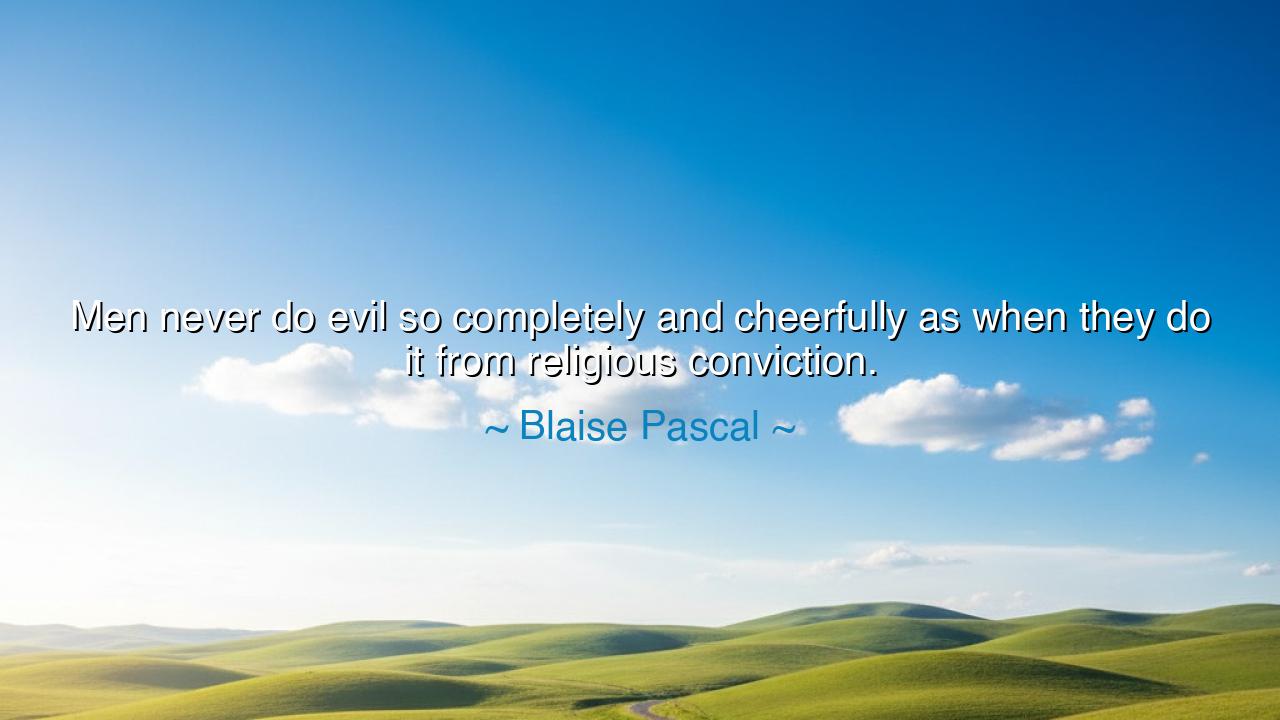
Men never do evil so completely and cheerfully as when they do it
Men never do evil so completely and cheerfully as when they do it from religious conviction.






"Men never do evil so completely and cheerfully as when they do it from religious conviction." — these powerful words from Blaise Pascal, the French philosopher and mathematician, echo a profound insight into the nature of human action and belief. Pascal’s statement challenges us to confront the often dangerous intersection between faith and power—how religion, when manipulated or misunderstood, can become a vehicle for evil done in the name of good. He points to the irony that men, convinced of their righteousness, are capable of committing the most heinous acts with a clear conscience and even with a sense of joy or cheerfulness. Pascal’s words serve as a cautionary tale about the potential for blind faith to justify actions that, if examined more critically, would be recognized as deeply immoral.
In the ancient world, the role of religion was central to life, and the gods were seen as both benevolent and vengeful. In societies like Greece and Rome, the gods were believed to guide human affairs, and religious practices were intertwined with the power of the state. Yet, even in these ancient civilizations, there was a deep recognition that religious zeal could lead to destruction when taken to extremes. The story of Cassandra, the Trojan priestess cursed to speak the truth but never believed, serves as a reminder that even when actions are justified through divine will, their consequences can be tragic. In the Greek myths, the gods themselves were often caught in cycles of wrath and vengeance, reflecting the dangers of acting in the name of divine justice without understanding the costs.
Pascal’s words also find resonance in the wars and conflicts that have scarred human history. Consider the Crusades, a series of religious wars fought by Christians seeking to reclaim the Holy Land from Muslim control. Pope Urban II, in the 11th century, called for the First Crusade, urging Christians to fight for God and promising them absolution for their sins. What followed was not a noble pursuit of righteousness, but a brutal campaign of bloodshed, pillaging, and destruction. Thousands died, and countless innocent lives were lost. Yet, the men who participated in these wars did so with a sense of conviction—believing that their violent acts were sanctioned by God. This cheerfulness in doing evil, borne from a religious conviction, is exactly what Pascal warned of: the danger of believing one’s actions are divinely justified, no matter how destructive they may be.
In another example, the Inquisition, a period in European history marked by religious persecution and torture, illustrates the destructive power of religious zeal. Church officials, convinced that they were purging heresy and safeguarding the faith, sanctioned the torture and execution of thousands of individuals. In the name of God, men inflicted unimaginable suffering upon those they deemed to be enemies of the faith. They acted with cheerfulness and conviction, believing they were doing the will of the divine. Yet, from the perspective of humanity and morality, these acts were evil—done with the assurance of righteousness, but without any true compassion or understanding.
The lesson in Pascal’s words is not a condemnation of religion itself, but a warning about the dangerous extremes to which faith can lead when it becomes intertwined with absolute power. Religion, in its truest form, is meant to elevate the human spirit, to guide us toward compassion, justice, and understanding. But when faith is used as a justification for violence, when it leads men to commit acts of harm in the name of righteousness, it becomes an instrument of evil. Pascal’s insight reminds us of the importance of self-reflection—to question our actions and motivations, even when they seem to be backed by divine will. We must ask ourselves: Are we truly acting out of love and justice, or are we simply using our convictions to justify self-interest and destruction?
In our own lives, we are called to examine the nature of our convictions. Whether in our relationships, work, or personal beliefs, it is easy to become zealous about our own views, to act with certainty and conviction, believing we are in the right. But we must always be cautious of the temptation to justify harm or injustice under the guise of righteousness. Self-reflection and compassion must guide our actions, ensuring that our beliefs do not become a weapon used to harm others. In moments of conviction, let us ask ourselves: Are we acting out of a desire to serve the greater good, or are we allowing our beliefs to blind us to the human cost of our actions? By seeking wisdom, understanding, and compassion in all that we do, we can avoid the dangers Pascal so rightly warned about—the destructive potential of religious zeal and the need for constant vigilance in our own hearts and minds.






AAdministratorAdministrator
Welcome, honored guests. Please leave a comment, we will respond soon